“You’ve got to be fucking kidding me,” I cried over Jon Batiste’s We Are blaring on our car speakers.
Jo and I were driving home from a movie date when we had to make a detour; ahead of us, we could see the strobing reds and blues of multiple police cars blocking an intersection.
Now, I usually try to keep my cool in the car—nowhere is so important to get to that an unavoidable detour should enrage me, and it’s safer to stay calm (even when, as is typically the case, I’m not the one behind the wheel). And we were only going home, not on any sort of rigid timeline.
But.
We had just seen All of Us Strangers, and we were trying to get home so we could cry.
As we drove in circles trying to navigate the narrow streets of a neighborhood we didn’t live in, listening to Jon Batiste sing, “When I move my body just like this / I don’t know why, but I feel like freedom,” I wondered aloud why Jo and I hadn’t thought to look up the film’s synopsis before deciding to see it in theaters.
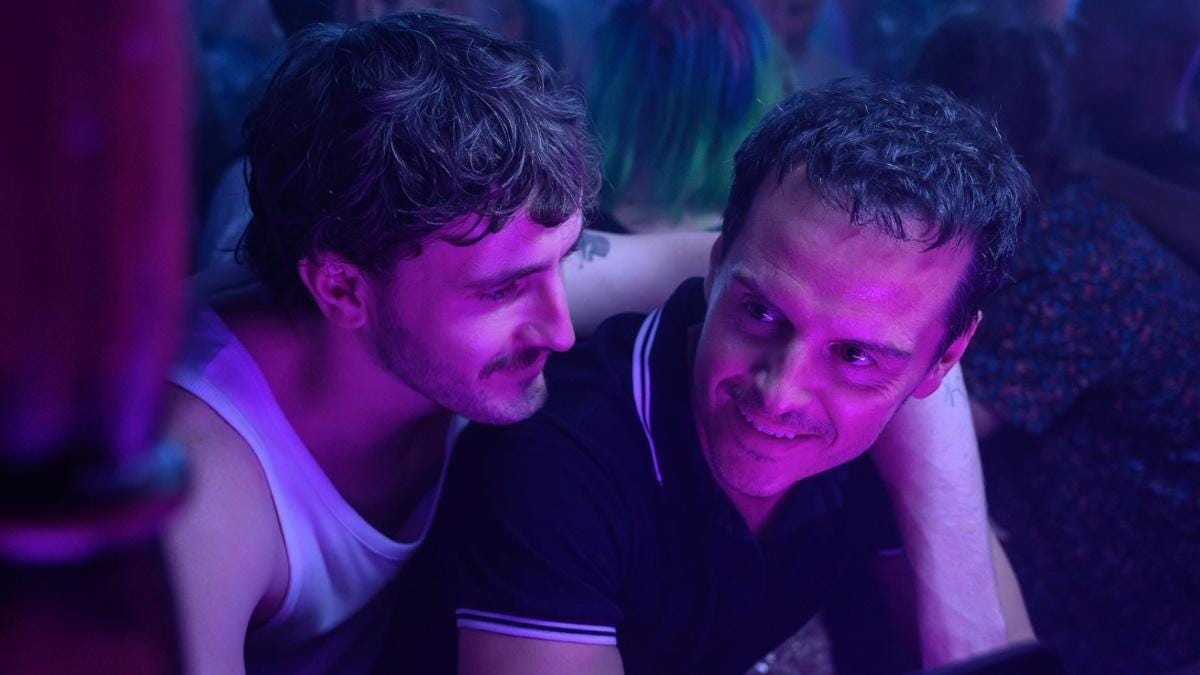
All of Us Strangers, directed by Andrew Haigh, came out in late December 2023. It is based on Strangers (異人たちとの夏), a 1987 novel by Taichi Yamada. The film centers on Adam (Andrew Scott), a screenwriter working on a screenplay inspired by his parents, who died in a car accident when he was twelve years old. One day, a neighbor in his almost entirely empty apartment building knocks on his door, drunk and rambling about the building’s eerie quiet. This is Harry (Paul Mescal), and though his initial offer of a drink is declined by Adam, the two soon connect once again: drinking, sex, dancing at nightclubs. Their relationship largely exists at night; during the day, Adam takes the train to his old town, where he finds his parents, called only Mum (Claire Foy) and Dad (Jamie Bell), still living at the house he grew up in until their deaths—unchanged, frozen in time just before the car accident. They want to know about the man Adam has become and invite him to visit again, though that offer grows more complicated after Adam comes out to them.
Adam struggles to really, meaningfully live in the present; he is, instead, stuck in his traumatic past. The film is essentially a dissection of post-traumatic stress disorder. What does it mean to confront your past? How do you heal from it and move forward?
Note: The rest of this newsletter contains some spoilers for the film—but limited to the first half (maybe two-thirds?) of its runtime.
Adam’s parents, trapped in the 1980s, are ill-equipped for Adam’s coming out. Mum asks if he has a girlfriend, and Adam decides to tell her that he’s gay; she is visibly repulsed. His mother asks him if he’s afraid of dying from HIV/AIDS, if he’s sad he can’t have children, if he’s sad he can’t get married, if he’s lonely. Adam insists that things are different now: HIV is not a death sentence; same-sex couples can get married and have children; and if he is lonely, he says, it has nothing to do with being gay.
Still, she pours out her mug of tea and offers him the rest of her food—she’s not going to eat it anymore.
His conversation with Dad goes differently. Adam returns to the family home after the conversation with Mum to find his father home alone. His parents have clearly discussed his coming out; Adam asks what his Dad thinks, to which he replies that he isn’t surprised—Adam was never able to throw a ball. Dad wants to know if Adam was bullied by the other boys as a child. The other boys and the girls, he answers.
Dad confesses to having heard Adam crying in his room after school sometimes. Adam asks why he never came into the room to check on him; instead of answering, Dad asks why Adam never told him what was happening. But Adam isn’t having it—he insists that his father answer first. Reluctantly, Dad admits that he didn’t want to think about having a gay son and that, in all honesty, he probably would’ve bullied Adam, too, if they’d been in school together. Adam says he could sense that when he was a child, and that’s why he never told Dad about the bullying. Unlike Mum, Dad expresses remorse for his shortcomings as a parent and asks if he and Adam can hug; in tears, they share an embrace.
Things are different now, Adam says again and again. But conversations with Harry reveal that, maybe, that isn’t exactly true.
Harry and Adam are of different generations. They discuss, for example, why Adam prefers the label “gay,” while Harry would much rather identify as “queer.” Adam has a decisively jaded demeanor compared to Harry’s (often drunken) earnestness.
Still, in other ways, they are very much the same. Like Adam, Harry is intensely lonely. He tells Adam that despite his best efforts, he hasn’t been able to find and build a lasting romantic relationship. And, though Harry’s parents are alive, his relationship with them leaves him wanting in many of the same ways Adam feels. In one postcoital conversation, Harry talks about not really having a relationship with his parents (especially his father) and not seeing his family much—despite a geographical closeness. He confesses that he feels like he has floated to (perhaps over) the edge. Adam asks what he means; Harry explains that his siblings are at the center, while he has drifted further and further from his family. Though his family wasn’t openly hostile to his queerness, he senses that being queer makes him fundamentally—and noticeably—different from his family in a way that enables them to create (whether by action or inaction) a distance between themselves and him. Harry believes that distance is inevitable.
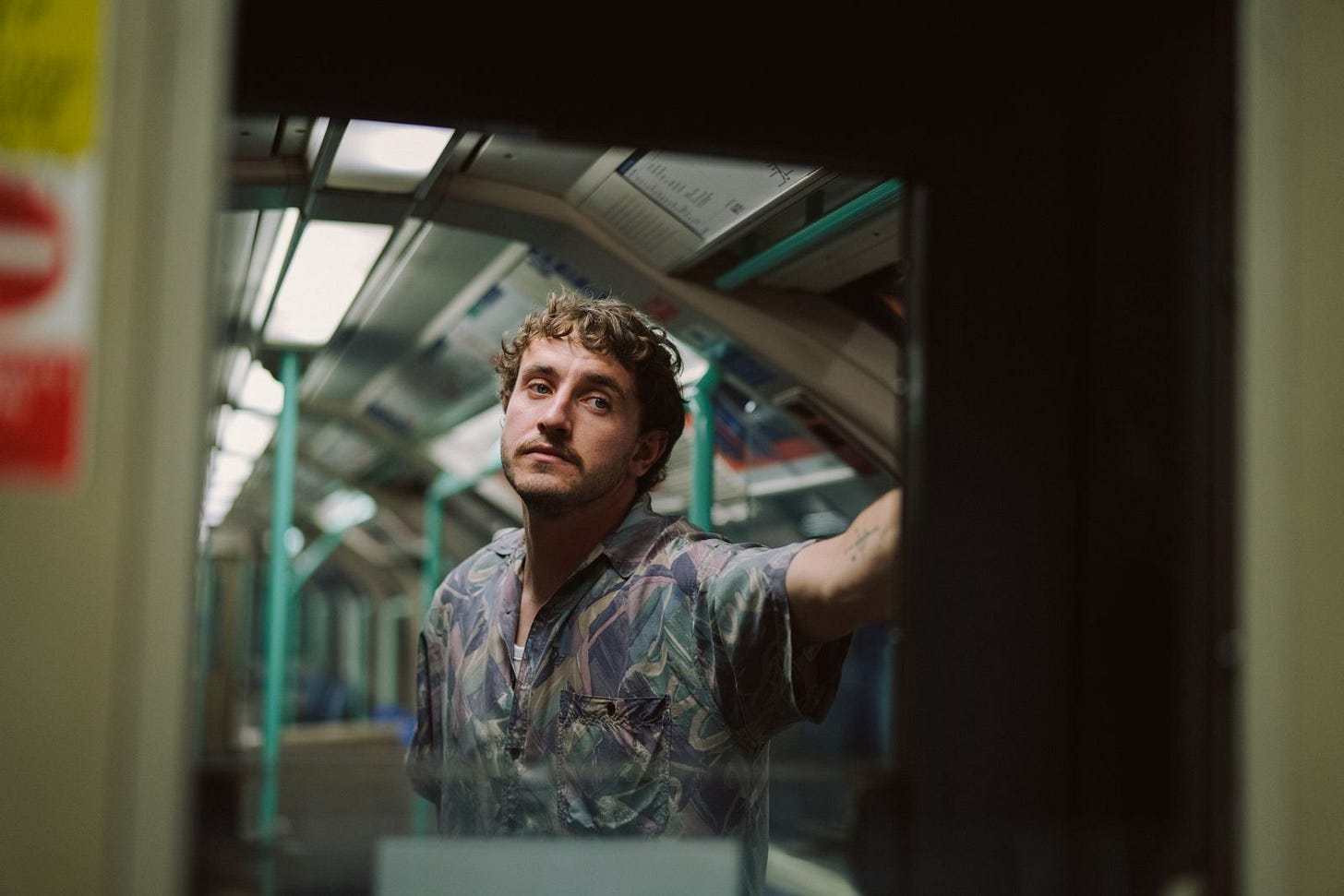
God, what a heartbreaking conversation. Until the final third of the film, this was the point at which I cried the most. I know so many queer people have felt that way.
Because I’ve felt like that, too. A lot of the time, I still do. There’s an ache in my chest, a knot in my gut, when I think about how my familial relationships have changed since I came out; so many of those shifting dynamics have left me feeling… well, like I’m drifting to the edge while looking back at everyone else in the center.
And not just with my family. I’ve so often felt apart from other people as a result of my queerness and transness. Many of my friendships quietly but rapidly disintegrated after I came out.
The loud and proud transphobes of the world will make it explicitly clear that they hate you for your transness, yes, but there are a lot of self-proclaimed liberals whose attitude seems to be, “queer people should be able to live their lives freely—as long as I don’t have to see them.” And when they decide that your queerness is too queer for their sensibilities, it makes you feel absolutely fucking crazy. Because they’ll never admit it. They’ll never tell you that’s why they stopped replying to your texts, stopped liking your Instagram posts, stopped having lunch with you in the dining hall, stopped asking you for help on the homework, stopped inviting you out. Why they stopped liking you. So part of you will always wonder—always hope?—that you’re wrong. That so many people stopped spending time with you shortly after you came out for a myriad of other reasons. You’ll start to believe that there are actually a hundred small reasons why people don’t like you—it’s not that you’re trans, it’s just that you’re awkward or annoying or sarcastic or cold or boring or depressed or anxious or or or or or or or OR.
But deep down, you know. They’re not the people you thought they were. Their affection came with conditions—most affection does—and one of those conditions was cisness. The joy you felt, finally sharing your truest self with the world, curdles. You start to feel embarrassed, ashamed, afraid. Of your queerness, sometimes, but also of all the other reasons you invented for why they might not like you anymore. You feel like you don’t belong.
And even though they’re the ones who drifted away from you (isn’t that always the excuse, we drifted apart?), you’re the one floating to the edge.
So, no. Things aren’t different now, Adam. Even if we all wish they were. God, we wish they were. The queer communities of which I’ve been a part over the years have been vibrant, caring, and committed to an aspirational sense of doing better. My hope for liberation was born and is nurtured in those spaces. Among other queer people, I don’t feel like I’m at the edge anymore. We are all together, at the center, holding one another.
The day after Jo and I saw All of Us Strangers, I was scrolling through Instagram and saw screenshots of tweets (Xes?) talking about the past week’s Saturday Night Live. Specifically, they were talking about the goodnights, during which the famously transphobic, unfunny “comedian” Dave Chappelle joined the SNL cast on stage. Bowen Yang, an SNL repertory member and gay icon, stood as far away from Chappelle as possible while still being on screen:
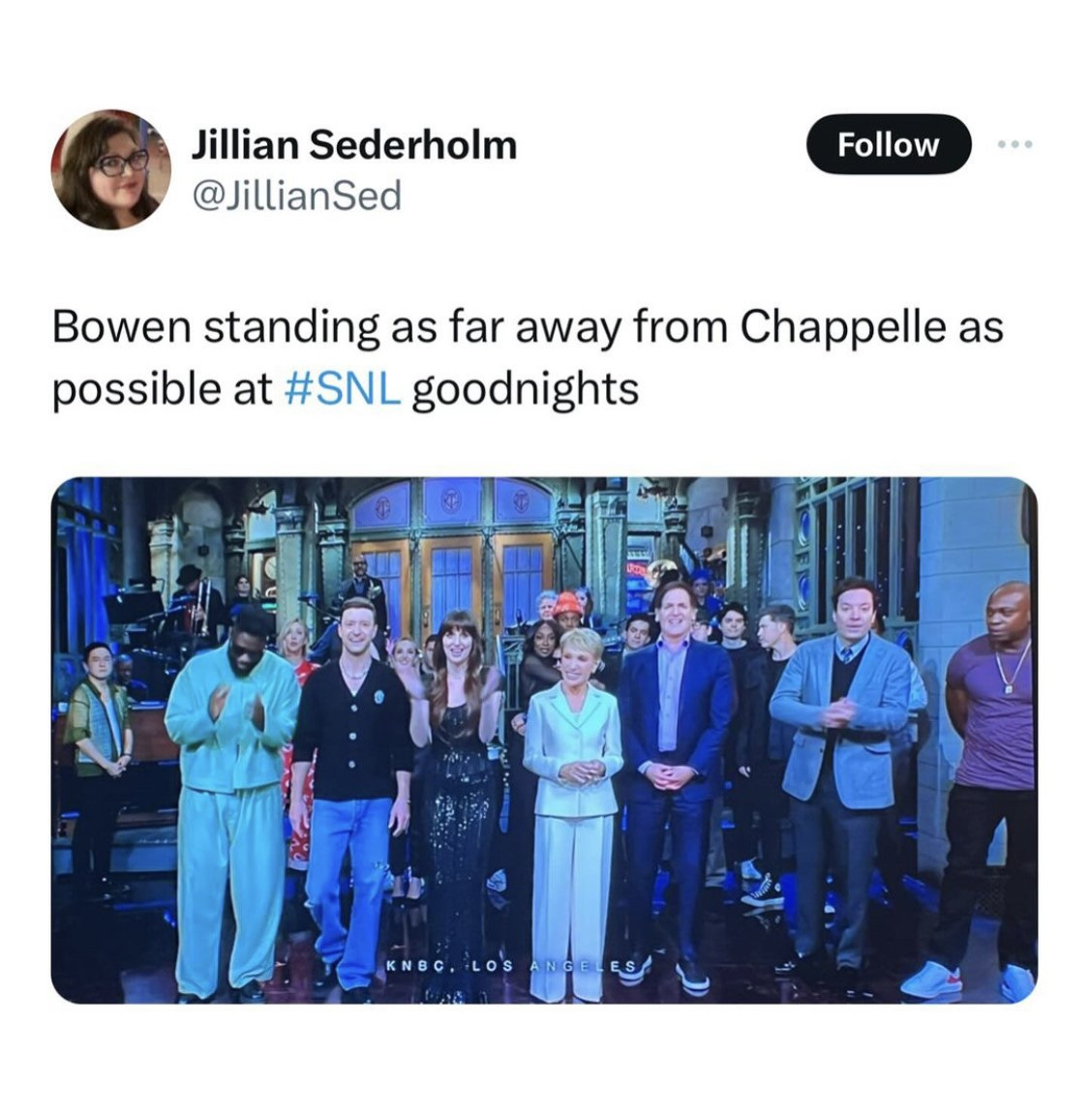
There it was. Though seeing Yang at the outskirts looking at his castmates front and center didn’t make me cry, that screenshot captured the central element of All of Us Strangers’s exploration of loneliness in the context of queer people with cishet families and friends.
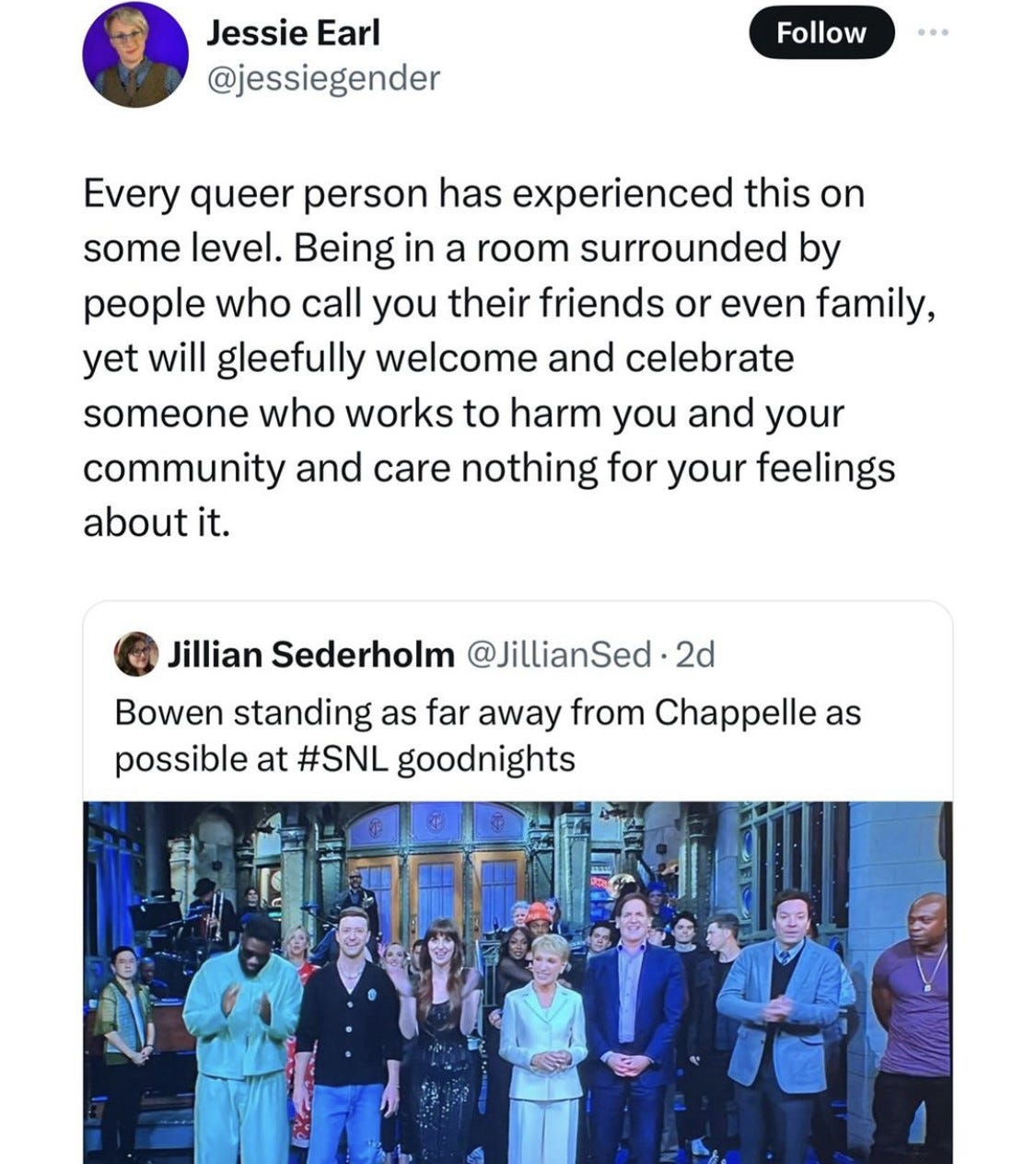
Okay. Maybe the photo of Bowen Yang did make me cry.
In my defense, I’ve been crying a lot lately!
It’s heartbreaking, though, to see this same pattern over and over again. To watch one queer person after another feel the sting or stab or slow-building ache of that kind of betrayal.
There were only ten of us in the theater when we saw the movie. In the very back, a group of teens were stoned and probably not having fun; their giggling stopped early on in the movie. In our row, a queer couple around our age, maybe a few years younger. Directly behind us, an older gay couple (like, “qualified for the senior discount” older) with a movie theater rewards card so worn it was nearly illegible. By the end, the couples—us included—were audibly crying. I left the theater feeling so fucking sad. I hadn’t cried in public since my sophomore year of college! But that years-long streak is officially broken.
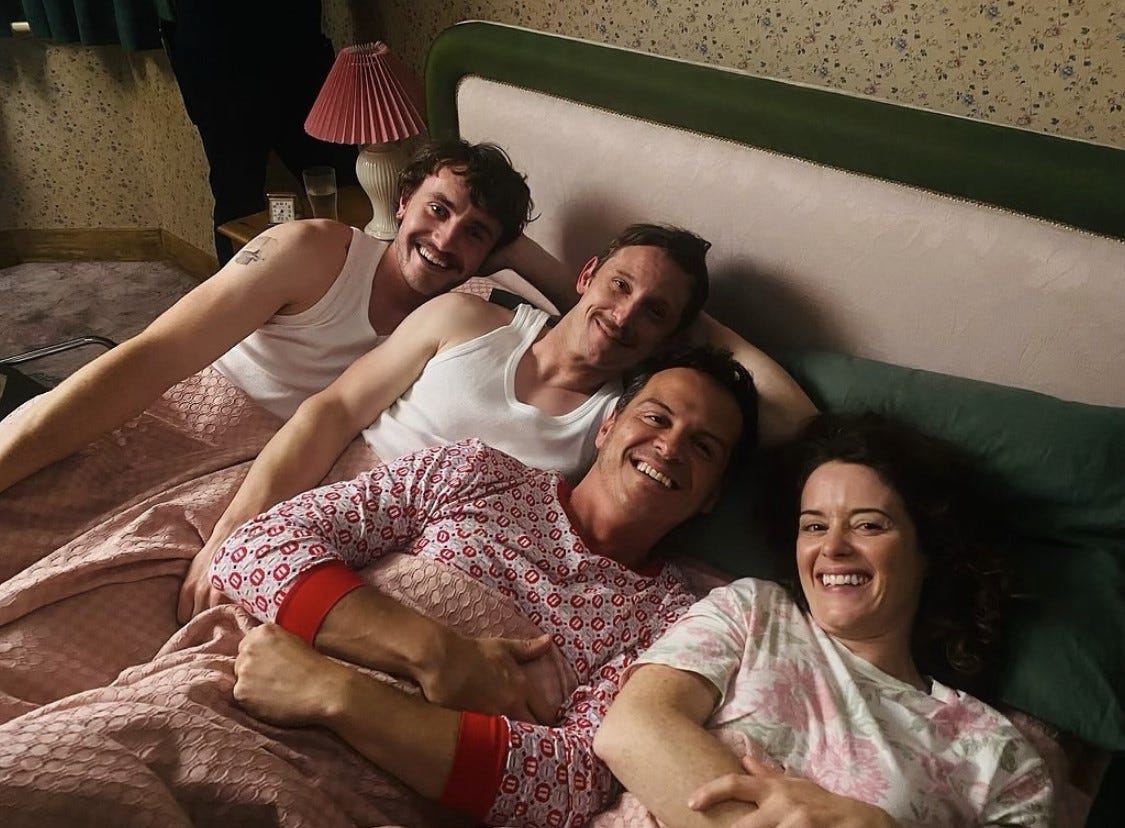
I told Jo that I wished I could make straight people watch the movie. Because at least sixty percent of the people at our showing were queer, and while we certainly see ourselves in the film, most of us don’t need the message of the film. We already know it. We’ve already lived it. The Mums and Dads of the world are the ones who should be watching the movie, not the Harrys and Adams.
Until they do (and probably even after, because sometimes you want a good cry), the Harrys and Adams of the world will keep going to see the painfully familiar, gut-wrenching films like All of Us Strangers because if we don’t, movie studios might decide that there “isn’t a market” for queer representation.
I wish I knew how to convince cishet people that it’s vital for them to really pay attention to queer stories—and not for entertainment.
My heartbreak makes me want to work toward a world in which a film like All of Us Strangers isn’t capturing a near-universal queer experience. It’s a beautiful film with brilliant performances (and talk about being pushed out of the center—all four principal actors in the film were snubbed during the Academy Award nominations). It’s also a film I might never be able to watch again because of how emotionally difficult it was to see. I used to feel unfairly angry at the unborn queers of generations to come because I was jealous of just the idea that their experiences would be more broadly positive than my mixed bag. And certainly, I feel angry at the cishet people who use the privilege of their cisness to look away from the hurts, big and small, that they inflict on queer people—though I try to move with grace and compassion as often as I can. But that anger only masks my own sadness, my grief for the life I had to which I can never return. To which I don’t want to return, most of the time—because my life is much fuller, much happier now that I am openly trans. So, maybe not my grief for that life itself, but for the relationships I had then that will never look the same. And my grief deserves to be responded to with love, which means my anger does, too. Art is intensely powerful, and I will do my small part to encourage cishet people to look, really look, at art like All of Us Strangers. I have faith in every person’s capacity for change, and I have faith in art’s ability to inspire that change. Inspiring cishet people to be kinder to and more genuinely curious about queer people (in the sense my art therapist means when they say I should be curious about all my emotions) will prove, I suspect, deeply important to building the future I envy and dream about.
Loneliness isn’t a fundamental part of the human condition, and it doesn’t have to be a central element in the queer experience. I believe in a future where queer people don’t have to fear coming out—in fact, I believe in a future where queer people don’t have to “come out” because gender and sexuality stop being labels arbitrarily assigned to babies based on a set of meaningless, unhelpful assumptions. I believe in a future where queer people don’t have to form their own circles on the edges, where queer people are never forced to leave the center. My activism is rooted in that belief.
I will never not know what it feels like—the pain Harry and Adam feel. It’s my pain, too. And, though it hurts like hell, I am grateful that I don’t have to feel it alone. And I hope that, in feeling it, I will be able to help ensure that future generations of queer people don’t.





i will not cry on the bus. i will not cry on the bus. i will not cry on the bus.